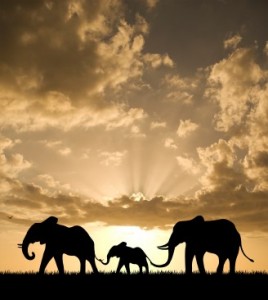Best of 2008/2009: Sally Henderson on saving African wildlife and her encounters with animals
Listen Now Download the show by right-clicking the link.

Sally Henderson (ABC.com.au)
Dr. Caldicott asks Henderson how she first became interested in visiting Africa, and Henderson recounts how her rewarding childhood experiences surrounded by Australian animals inspired her lifelong interest in wildlife conservation. Henderson speaks about her many close-up encounters with African elephants, including the terrifying time when an elephant saved her life. She tells Dr. Caldicott about the many ways elephants communicate, sometimes telepathically, and their great intelligence and sensitivity.

Elephants as well as rhinos are now endangered. Henderson talks about the poaching of the rhino population for products used in Asia and elsewhere. Poachers kill many elephants, and Henderson has aided efforts to keep them in protected areas, and to educate Africans to save the elephants, at least until old age. Elephant populations have fallen drastically from their original millions to endangered levels today. Read the April 9 Scientific American article Are Elephant Populations Stable These Days?
Henderson vividly describes her experiences in Namibia, more of a pristine wilderness than other parts of Africa. Dr. Caldicott says that Namibia is a major source of uranium, used to make nuclear weapons, and diamonds. Over the course of the program, Henderson also imparts her electrifying experiences with big African cats on several trips and longer stays. She provides many insights into wild feline behavior, including the surprising difference between the leopard and other cats such as lions.

Dr. Caldicott and Henderson also touch on the quality of life for poor Africans, and the hardships and disease they often face. Henderson lauds the work
Bill and Melissa Gates are doing through their foundation in the area of malaria prevention, on
a continent where the vast majority of people cannot afford anti-malarial medications because of the greed of pharmaceutical companies (who would rather market and profit from drugs for depression and low libido, available
to affluent people). The hunting-and-killing mentality of sport hunters is another topic of this episode. Henderson and Dr. Caldicott agree about the peculiarity of hunters who boast about slaughtering wild animals. They concur that humans are the worst predators on the planet. Erich Fromm’s book The Anatomy of Human Destructiveness inquires into why some men enjoy violence, including hunting animals.
After the formal conversation with Henderson ends, there is a three-minute music break, after which Dr. Caldicott comes back on the air to describe her experience attending a conference that included Robert Mugabe, the murderous president of Zimbabwe. During the dialogue with Henderson,
Dr. Caldicott had mentioned encountering Mugabe in the context of whether or not African leaders care about endangered animals.
For more information about saving African wildlife, visit the websites of Save the Elephants, World Wildlife Fund, The African Wildlife Foundation, Save the Rhino and Wildlife Direct. Also visit the web pages of PETA’s Save Wild Elephants campaign and actress Tippi Hedren’s Shambala Reserve, which saves big cats which were abused as illegal exotic pets.
Read the articles African Safaris - Elephants Must Be Saved From Extinction, Extinction Crisis Emerges for World Mammals: One in Four Species at Serious Risk, Will Central Africa’s Forest Wildlife Be Eaten into Extinction?, Elephants Slaughtered to Feed Soldiers in Zimbabwe, Satellite’s-Eye View of an Africa Despoiled [35-image slide show], and The Saddest Show on Earth, about the terrible plight of elephants in circuses.